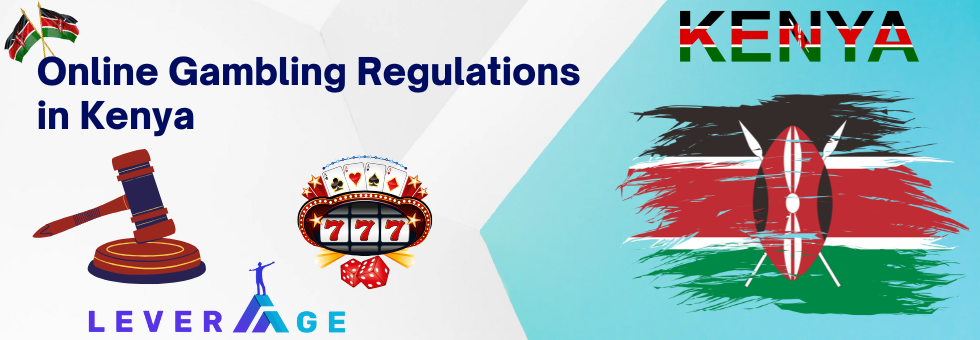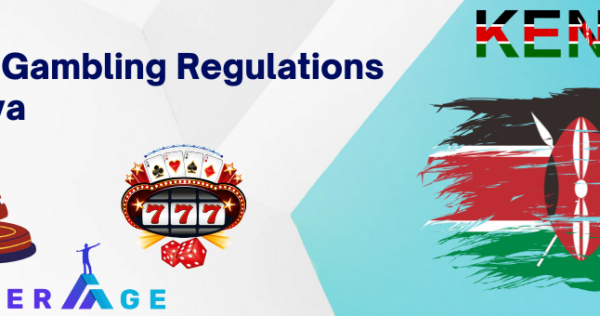Online Gambling Regulations in Kenya
1. Introduction
Online gambling in Kenya is a thriving industry with most youths engaged in one form of gambling. The Kenya government is aware of the rising gambling cases and has developed laws and regulations to control the industry. The industry is highly taxed and a major source of revenue for the Kenyan government. Most rules and regulations have been put in place to collect revenue and control the rising gambling phenomena. There are laws in place to regulate betting companies that operate in Kenya. Any gambling company operating legally in Kenya must have a license from the Betting Control and Licencing Board (BCLB). BCLB was introduced in Kenya in 1996 in Section 3 (1) of the Betting, Lotteries, and Gaming Act. The body’s main aim is to prevent illegal gambling and ensure fairness in the industry.
These laws are crucial to the growing interest in the Kenyan online gambling market. With advancements in technology and internet access, most youths can easily gamble through their mobile phones. The ease of accessibility of smartphones has contributed to the growth of the industry. In the financial year ending 2023, Kenyans spent a whopping Ksh88.5 billion to place bets. This has created a lot of interest with the Kenyan Revenue Authority (KRA) collecting sh6.64 billion from the 7.5% excise tax alone. In this article, we will cover online gambling regulations in Kenya. We’ll cover all the licensing procedures, laws and regulations, taxation, compliance, and enforcement.
2. Overview of Kenya’s Online Gambling Market
The Rapid Growth of Kenya’s Online Gambling Industry
The online gambling industry in Kenya is on the rise with several betting companies launching and scaling businesses. It is a big business with research showing that Kenyans place an average of sh242 million per day on bets. The figure translates to sh 2,806 every second, sh168,333 every minute, and sh10.1m every hour on bets. Online gambling in Kenya has passed from a part-time activity for most people to a full-time economic activity. The industry is at a stage where it could rival the National Securities Exchange that stands at sh94.2 billion as of 2023. Most punters gamble on sports and casino games. Sports betting, especially the English Premier League, Serie A, La Liga, Bundesliga, and UEFA Champions League are quite popular. There is also a shift towards casino gambling. Punters now place bets on virtual games and aviator games which give results in a short period. Virtually all betting platforms offer multiple casino games to meet the rising demands for casino gambling.
Mobile-Based Gambling Shaping the Regulatory Landscape
The regulatory landscape has changed with the rise of mobile-based gambling across Kenya. Internet penetration across Kenya and high number of smartphones has made betting a lot easier for most Kenyans. The rapid rise in online gambling attracted foreign companies to invest in Kenya. Kenyans can easily gamble on the go from anywhere. The rapid rise of mobile-based gambling led to stricter rules and regulations. Higher taxes have been introduced and high licensing fees. Tough tax measures have seen some big betting companies exit the market. However, this has now slowed the industry. Instead, it has made the industry safe with new brands launching and making the industry competitive.
Key Statistics of the Kenyan Online Gambling Market
The Kenyan online market is on a steady rise with ease of accessibility of internet and smartphones playing a crucial role. A geopoll research shows that at least 76.16% of Kenyans have placed a bet in their lives. It’s only 23.84% of the population that has never engaged in any form of gambling. Kenya is a leading market in Africa despite recent regulations and taxation. The research shows that at least 63% of the population have placed bets in the past 12 months. It’s a growing market with a market penetration of 0.6% as of 2024. This is a projected revenue of US$99.68m in 2024 alone. The market volume is expected to grow further and hit US$130.90m by 2029. In the year ending 2022, betting firms reported revenues hitting sh 50 billion.
Big brands like Sportpesa and Betika dominate the market. However, there has been stiff competition with new firms like Shabiki, Odibets, Mozzart, and Paripesa entering the market. Most users prefer sports betting with Kenyans loving the English Premier League. However, there has been a rise in online casinos and virtual games. Users engage with betting sites through apps and websites via their smartphones. It’s a seamless process with most Kenyans gambling from anywhere with ease.
3. Legal Framework Governing Online Gambling in Kenya
Historical context of gambling laws in Kenya
Gambling in Kenya is now new with Kenyans enjoying land-based casinos since independence. Before 1952, Kenya did not permit gambling. This was not until the Christian Council requested decriminalization of the gambling in Kenya. Regulation on gambling in Kenya was introduced in 1966 after independence with the creation of the BCLB. The regulatory body was created to control the licensing of betting and gaming in Kenya. Most of the laws around gambling were around licensing. There was not much on online gambling. The introduction of smartphones and the internet in the 90s started to change the industry. It was not until early 2001 that most Kenyans started betting online. A 2021 FinAccess Household survey saw an increase in betting from 1.9% in 2019 to 13.9% in 2021.
Role of the Betting Control and Licensing Board (BCLB)
The BCLB draws its mandate from the 1966 Betting and Gaming Control Act. It provides control and licensing of all gambling companies in Kenya. The body provides licensing, regulates, advises, and guides businesses and individuals involved in gambling activities in Kenya. It’s responsible for ensuring fairness in the industry, eradication of illegal gambling activities, and compliance of the set-out rules and regulations. The regulatory responsibilities are divided between the National government and the County government. County governments can issue permits and licenses based on the premise location, product type, and workforce size. However, all online gambling companies must be licensed and regulated by the BCLB. The BCLB issues licenses and regulates all activities done by betting companies. It ensures compliance and can revoke or cancel licenses.
What is Legal and What is Illegal Under Current Kenyan Laws
Kenyan gambling laws are clear on what is legal and illegal gambling. Currently, in Kenya, gambling is legal only if it’s conducted through licensed operators. It’s up to the BCLB to perform due diligence and decide what gambling activities are legal and illegal. So if an operator is running operations without a license, then that’s illegal gambling. Legal gambling firms have a license, a presence online, and recognized payment methods.
Recent Legal Reforms and Their Effects on Online Gambling
Kenya’s gambling laws and regulations are under constant change with the government looking to control this lucrative industry. Recent legal reforms are around taxation from the operator revenues and user winnings. The recent reforms are looking to increase tax collection while keeping a control on the increased gambling activities among the youth. The reforms are aimed at discouraging youths from excessive gambling activities. New reforms will see stricter regulation of the industry. Under the proposed new changes, all operators must obtain a license from the government. The BCLB has the power to issue licenses, revoke licenses, and impose fines on firms breaking the law.
There are tough advertising restrictions on betting firms. There are specific times for firms to advertise on TV and radio. The new reforms will also see tougher restrictions on age limits for gamblers. Betting firms must find ways to identify the age of users to comply with the set out laws and regulations. Betting firms found allowing underage betting will be fined or have their licenses revoked. Most firms are now using phone numbers to identify users and ensure they are above 18 years old.
Potential for Future Legal Developments in the Industry
There are expected to be more legal developments in the gambling industry in the future. Most of the legal reforms were expected to increase the tax rates for bookmakers and gamblers. The government has already introduced taxes to curb the rising gambling cases. There are taxes on the stake amount, winnings, and the bookmaker’s revenues. With the government looking to generate more income, you can expect increased tax rates in each financier year.
4. Licensing and Compliance Requirements for Operators
Step-by-step process for obtaining a gambling license in Kenya
Once investors have a clear understanding of the regulatory landscape, they can apply for a gambling license from the BCLB. The process starts with a formal submission using a prescribed letter format from the BCLB. The BCLB will share the application copy with the county government giving it an opportunity to raise an objection. There is an application fee of ksh40,000. The amount is refundable, but the BCLB can choose to forfeit it under section 64 of the BLGA. All necessary documents required by the BCLB including financier statements must be attached on the application form. The BCLB retains the discretion to request for additional documents as it wishes. It then conducts its own investigations before choosing to issue or deny a license.
Ongoing Compliance Requirements
The issue of a license does not bring an end to the oversight by the BCLB. Betting firms must continue complying with the set-out requirements like advocating for good gambling practices, age restrictions, and advertising restrictions. The firms must regularly report to the BCLB and provide necessary documents upon request. Betting firms must implement Anti-Money Laundering (AML) and Know Your Customer (KYC) measures. This ensures they operate within the law without giving opportunities for criminals to launder money. It’s the responsibility of the betting forms to comply with all tax obligations. They need to submit taxes from the player’s winnings and their own revenues.
Common Compliance Challenges Faced by Operators and Mitigation Measures
Despite the thriving market space and continued growth, operators face various compliance issues. While they can set age restrictions through KYC, it’s difficult for operators to control underage children from accessing adult phones and gambling. This can be mitigated by campaigns on TV and radio requesting adults to keep gambling from persons under the age of 18. There are also challenges on taxation with firms finding it difficult to comply with all tax measures. Tax on the user’s stake and winnings have proved a challenge with some firms like Betin even exiting the market altogether. It’s up to all stakeholders to discuss new reforms in the industry and their likely effects before implementation. Betting firms and regulatory bodies must work together to create laws that protect the general public without drastically affecting the industry.
Taxation of Online Gambling in Kenya
Overview of the Kenya Tax Structure for Online Gambling
The Kenyan tax structure on online gambling is elaborate with the government deliberate on its tax measures. It’s an area that has proven challenging for punters and bookmakers with the government looking to retain control of this lucrative industry. For example, the Minister for Interior Fred Matiangi clamped down on most forms for tax evasion and money laundering in 2019. This was followed by a flurry of taxation laws which saw most firms exit the market. Excise duty on betting rose from sh5.5 billion in 2022 to sh6.64 billion in 2023.
Taxation on Operators and Players
The government has introduced a 15% tax on betting firms on gross revenue and a further 30% corporate tax. There is a further 20% withholding tax on any amount won. The tax measures were introduced to curb betting among low-income earners while also helping the government generate extra revenues.
Insights of How Gambling Policies Have Evolved
The Gambling policies in the Kenyan market have evolved with the rise of online gambling. There is a need to control the level of gambling among Kenyan youth without affecting the industry. Most policy changes revolve around taxation with the aim of curbing betting. Initially, taxation was on the betting firms alone. However, this has changed with the player winnings subjected to a 20% withholding tax.
Economic Impact of Gambling Taxes on the Kenyan Market
The government has realized the crucial role the gambling industry plays in the economy and taken measures to increase its revenue collection. With increased taxes on the industry each year, the government is finding it a good source of revenue. Gambling revenue is expected to hit US $ 98.68 million dollars as of 2024. It is a key industry greatly contributing to the Kenyan economy.
The Role of Taxation in Regulating the Industry to Ensure Fair Play
Taxation measures are necessary in regulating the industry and ensuring fair play. All licensed betting firms must pay taxes to ensure the industry continues thriving. The BCLB must curb illegal firms that don’t pay taxes to ensure fair play for all stakeholders.
6. Enforcement of Gambling Laws and Penalties
Gambling Laws and Penalties Enforcement for Compliance
It’s up to the BCLB to ensure all set out laws and regulations are followed by all operators. All betting firms need to share their financier records with the regulatory bodies and pay their taxes accordingly. The BCLB will ensure all firms are compliant and operating within the laws. Illegal firms should be cracked down and penalized to ensure fair play. Enforcement measures include penalties, fees, license revocation, and even cancellation.
The Role of Law Enforcement Agencies and BCLB to Monitor Operations
All government law enforcement agencies must work together to ensure compliance and smooth operations. Illegal operators are arrested by the police and criminal proceedings against them taken to court. The BCLB must ensure firms are compliant while the Kenya Revenue Authority must ensure taxes are paid according to the firm’s revenues.
Penalties for Non-compliance
Penalties for firms that are non-compliant include fines at the discretion of the BCLB. The BCLB can impose fines for illegal firms or start criminal proceedings in a court of law. For licensed firms that are non-compliant, fines can be set or licenses revoked. Criminal penalties can also be preferred depending on the severity of the irregularities.
Efforts to Combat Illegal Gambling Platforms and Challenges Faced in this Digital Era
Regulatory bodies are faced with the challenges of combating illegal betting platforms. Licensing is the first step at combating illegal firms. The regulatory body must also ensure firms use recognized payment methods that can be tracked for easy compliance. However, this can be challenging in this digital era where everything is done online. It’s a challenge to combat cross-border firms that use cryptocurrency as a means of payment.
7. Consumer Protection and Responsible Gambling
Kenya’s Legal Framework for Consumer Protection in Online Gambling
It’s the mandate of the BCLB to protect consumers and ensure responsible gambling. The regulatory body must ensure firms comply with the game rules and that consumers are paid their winnings without cheating. It must ensure lotteries are fair and carried out without manipulation. Firms must show financier proof of the lottery amounts. The BCLB must also promote responsible gambling through education. All adverts must include warnings about the side effects of gambling.
Regulation to Prevent Gambling Addition
The BCLB has set out regulations to prevent gambling addiction. Regulations include limited advertising times and advocacy of responsible gambling on every advert. There are also efforts to force betting firms to provide a clear way for gamblers to exit from the platform whenever they want. Gambling should only be accessible to persons above the age of 18 years. Firms must perform a KYC and ensure only adults are able to access and place bets on their platforms.
Efforts to Ensure Fair Play and Prevent Fraud
Betting must comply with the rules and ensure fair play for lotteries and other betting activities. The BCLB should monitor all activities and ensure they are fair and no firm is cheating. In cases where gamblers feel cheated, they can report to the BCLB for investigations. There are also rules to prevent fraud with most sites ensuring all money paid must at least be gambled before withdrawal. There are also limits on deposits and withdrawals to prevent fraud.
Responsible Gambling Activities Mandated by Law
To ensure responsible gambling, there are limits on gambling advertising and promotions. The BCLB has set out limits on the amount of gambling ads on TV and radio. For example, gambling ads on TV are done past 10 pm to protect underage persons. Betting firms are also required to encourage responsible gambling. They should also provide resources for persons addicted to gambling to recover.
8. Future Outlook and Regulatory Challenges
Examination of the Future Online Gambling Regulation
You can expect more restrictions on online gambling regulations in Kenya. As the market continues to grow. The future of online gambling in Kenya looks bright with the government seeing it as a potential revenue source. You can expect more collaboration by all stakeholders on future regulation to better the industry.
Potential Upcoming Changes to Laws and Policies
Potential upcoming changes to laws and policies can be expected around taxation. There are debates on the impacts of taxing the player’s stake and winnings and the overall impact on revenue and curbing excessive bettings. Changes are likely to affect the rates at which player winnings are taxed and the firm rates.
Challenges Faced by Regulators in the Fast-Evolving Industry
Despite the industry thriving, there are challenges in this digital era. There is a rise in the Esports betting market which is difficult to monitor and control. New firms have also emerged offering cryptocurrency payment methods which are difficult to track. There are also cross-border betting forms that can easily be accessed from Kenya. It’s difficult to regulate such firms posing a challenge for the legally operating firms.
9. Conclusion and Key Takeaways
Overall, the online gambling market regulations are evolving each year as the government looks to keep control. It’s a crucial industry with revenues in billions of shillings and one that must be regulated to protect the consumer. There are clear laws and regulations for all firms looking to engage in online gambling in Kenya. All firms must apply for a BCLB license and comply with all the set-out laws and regulations. Illegally operating firms can be penalized and criminal proceedings against them initiated. It’s crucial for all new firms looking to launch in Kenya to understand the regulatory landscape before applying for a license. You can seek legal advice from a local expert to ensure a smooth process when setting up a new firm in Kenya.
Disclaimer
The information provided on this page is for general informational purposes only and does not constitute legal advice. We are not a law firm or a licensed legal authority, and the content should not be relied upon as a substitute for professional legal counsel. Any reliance you place on this information is strictly at your own risk. We assume no responsibility or liability for any errors or omissions in the content provided or for any outcomes resulting from its use. Always consult with a qualified legal professional for advice tailored to your specific circumstances.










